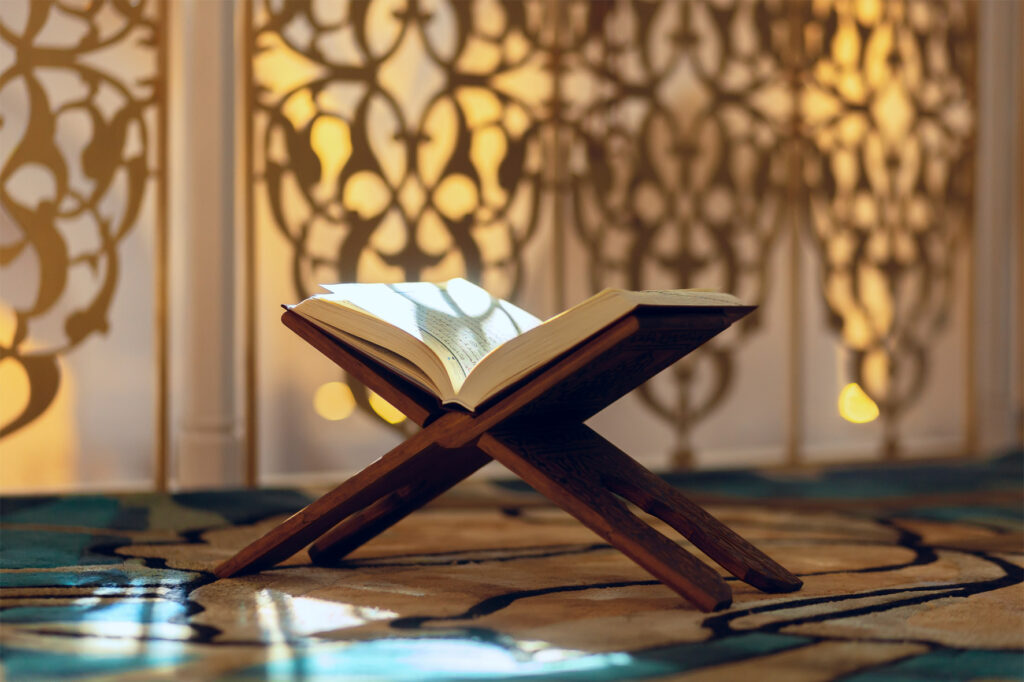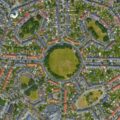Teaching Islam in state schools: Part 2
Teaching Islam in state schools: Part 2
Many Muslim students in the UK and the Netherlands attend Islamic teachings after regular school hours, as there are only a few state-funded Muslim schools. Does this show that Muslims’ educational demands have not been met?
This article is part of our series on the role of religion in education across Europe.
In the first article in this series, we discussed the first model of Islamic education, in which no Islamic Religious Education (IRE) is provided in state schools. This model is followed by countries such as France, Swiss French-speaking cantons, and Italy, despite the relatively large share of Muslims in these countries. Some other countries, like the United Kingdom and The Netherlands, advocate the ‘religion for all’ approach: teachings on world religions including Islam are thus provided in state schools in those countries.
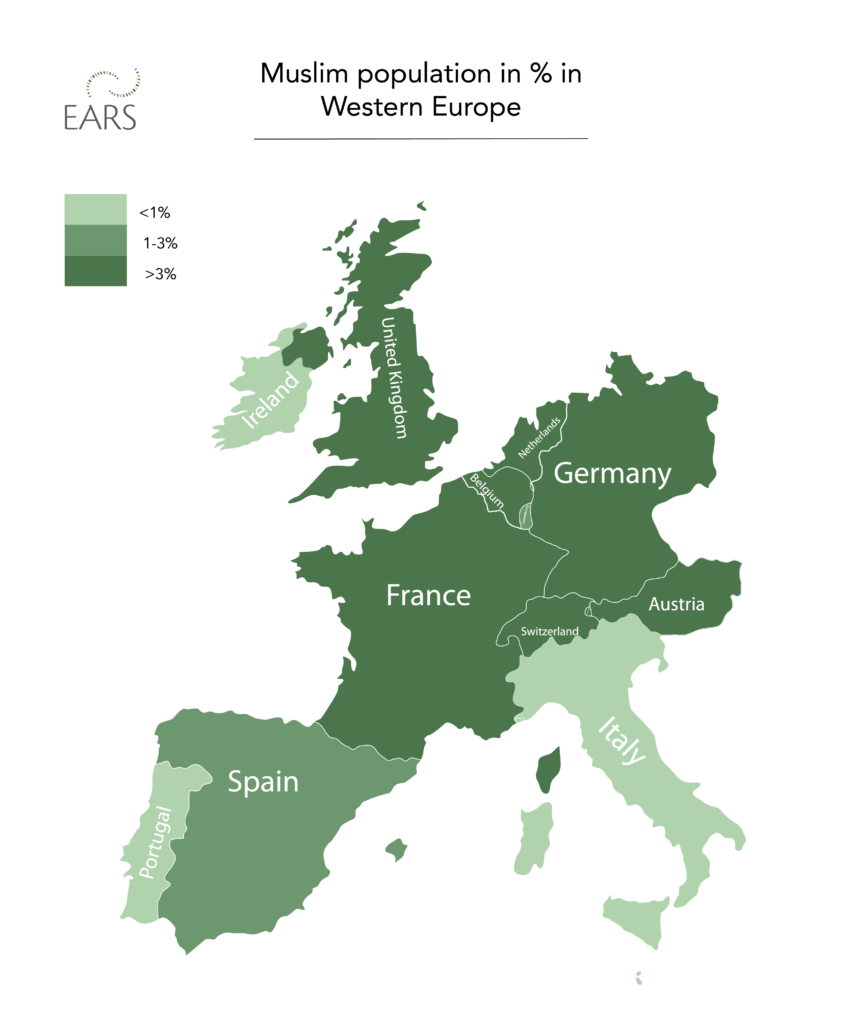
Source: SMRE
United Kingdom: a multi-religious approach to religions
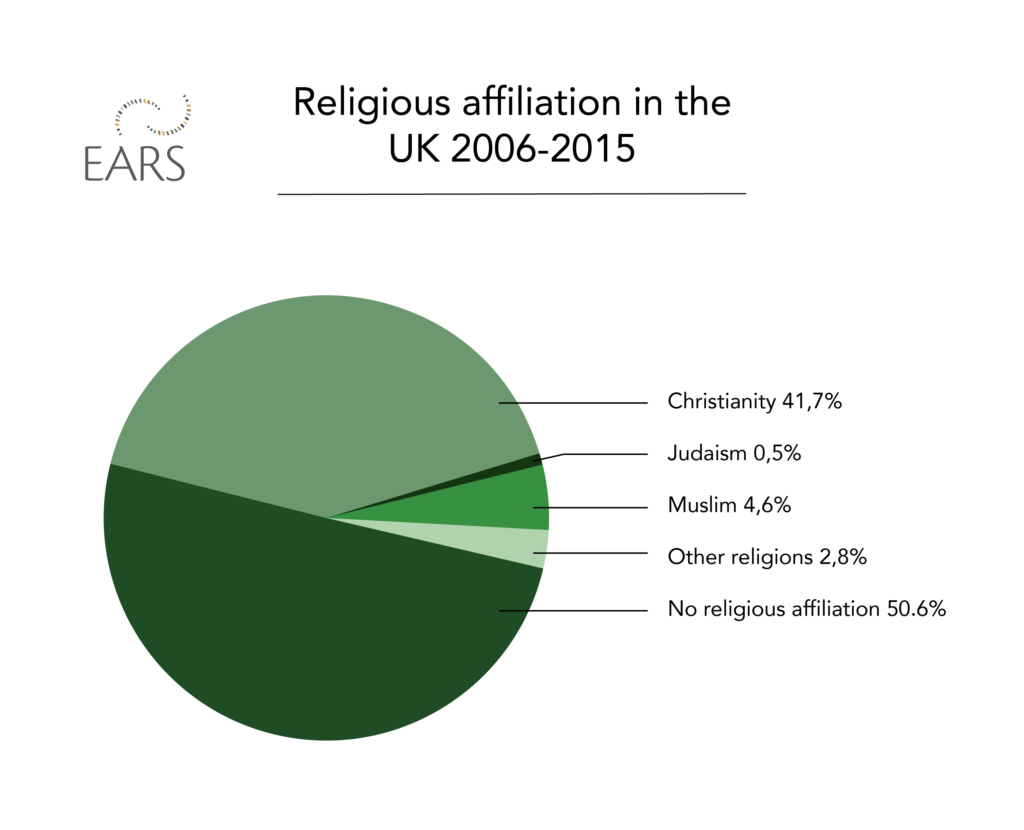
Source: SMRE
In England and Wales, Religious Education (RE) in public schools is non-confessional with a multi-religious approach and an emphasis on Christianity. There are only a few state-funded private Islamic schools.[1] In Scotland, RE is determined by the Scottish Parliament and commonly known as Religious and Moral Education.[2] It consists of learning about Christianity and other world religions. In Northern Ireland, RE is given to pupils in all kinds of schools. However, it has been determined exclusively by representatives of Christian denominations,[3] without reference to other religions.[4]
There are more than 3 million Muslims[5] in the UK and currently over 100 privately financed and seven state-funded Muslim schools in Britain.[6] The government has been criticised for not providing Muslims with schooling provisions parallel to other religious groups.[7] As a result, the majority of Muslims attend community school (state schools that are funded by local authorities),[8] whereas only a few attend Muslim schools. Similar to France, many Muslim families send children to Catholic schools.[9] In some Church of England schools and Catholic schools, Muslim pupils even outnumber Christians.[10]
Ireland: RE in supplementary schools for Muslim pupils
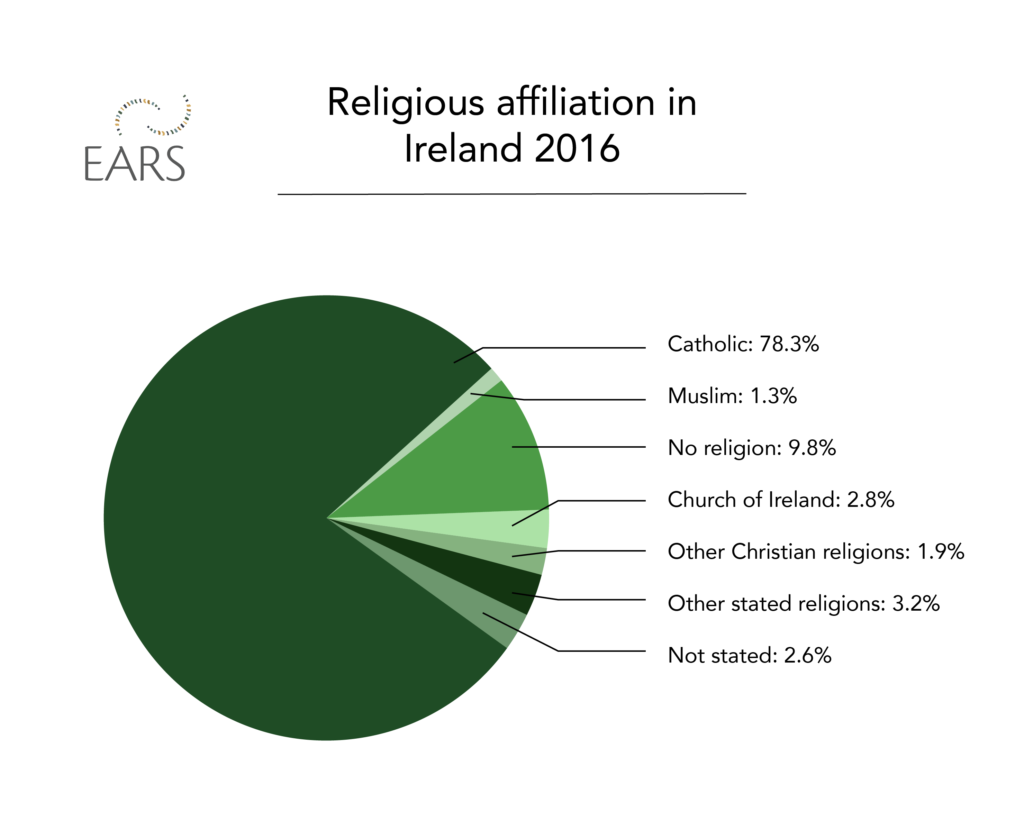
Source: Religion – Religious Change – CSO
Turning to another British Isle, we can recognise that the situation in Ireland is slightly different. Estimates of 2016 mention about 63,443 Muslims in Ireland representing 1.3% of the population.[11]
In Ireland, education is generally undertaken by the state in cooperation with the Catholic Church, as most schools in Ireland are Catholic schools in which teachers are paid by the state.[12] Nevertheless, other religious communities can also apply for state funding as long as they teach the Irish primary school curriculum.[13] RE is included in the Irish curriculum and it is regulated by the different school patron bodies.[14] At present, there are two state-funded Muslim primary schools[15] and several supplementary schools for children who cannot attend the Muslim primary schools. The majority of Muslim pupils in Ireland, however, attend non-Muslim schools and attend religious education in these Muslim part-time schools.[16]
The Netherlands: lessons in ideological movements in state schools
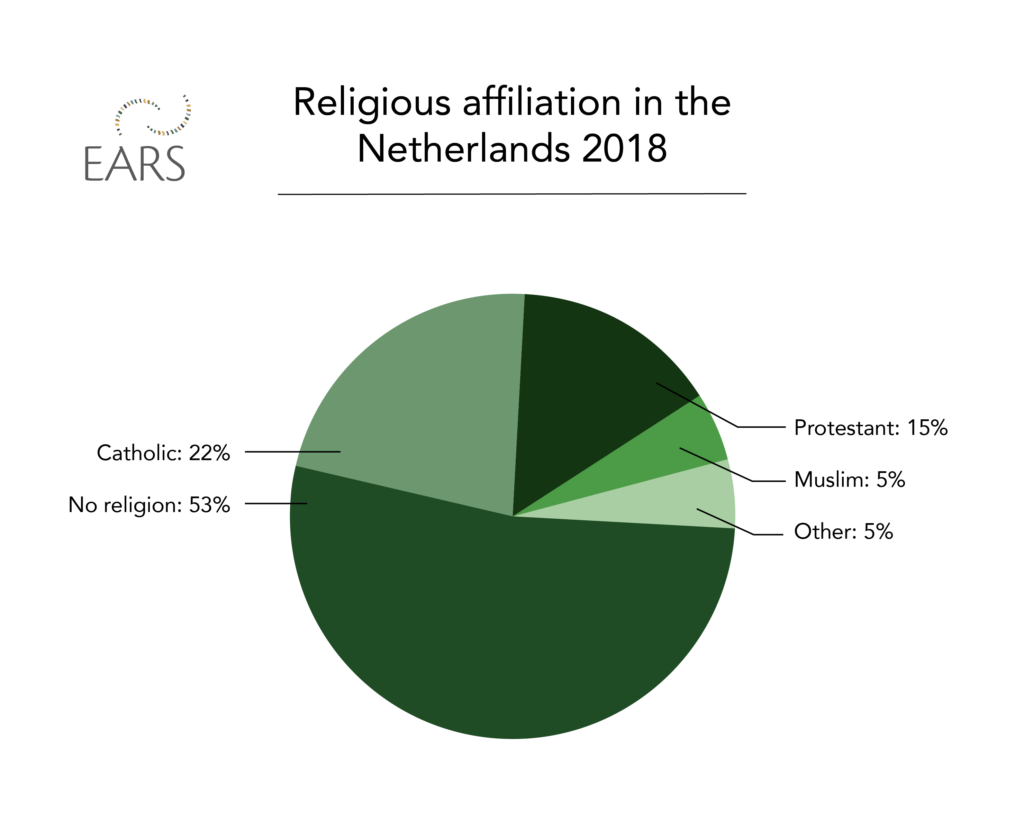
Source: Netherlands: population, by religion 2010-2018
The Netherlands, with a total population of over 17.2 million inhabitants,[17] counts roughly 6% of its population as Muslim.[18]The majority of Dutch Muslims have their roots in Turkey and Morocco.[19] In the Netherlands, private schools are largely faith schools with the main denominations being Roman Catholics and Protestants.[20] In religiously neutral public schools, especially in primary school, classes on ideological movements are mandatory, although it is not explicitly stated that all religions should be taught.[21] Nevertheless, if classes do include religion, main religions (Christianity, Judaism, Islam, Hinduism, and Buddhism) are covered.[22] On a local level, Islamic Religious Education can be given in state schools if a local Muslim community provides the teacher. It is then subject to state control. For example, the school can request the class is taught in Dutch rather than in the mother tongue of migrant pupils.[23]
Owing to the constitutional freedom of education, Muslims have the opportunity to establish state-funded Islamic schools. In 2018, there were 56 Islamic schools in the Netherlands,[24] which did not even begin to meet the demand for more Islamic schools.[25] Add to that the fact that Muslim communities face more difficulties in establishing new Muslim schools due to recent governmental policies,[26] many Muslim students receive Christian religious instruction. Almost half of the Turkish and Moroccan students attend privately funded and organised Quran classes after school, typically in local mosques.[27]
Monaco: teaching world religions in a Catholic country
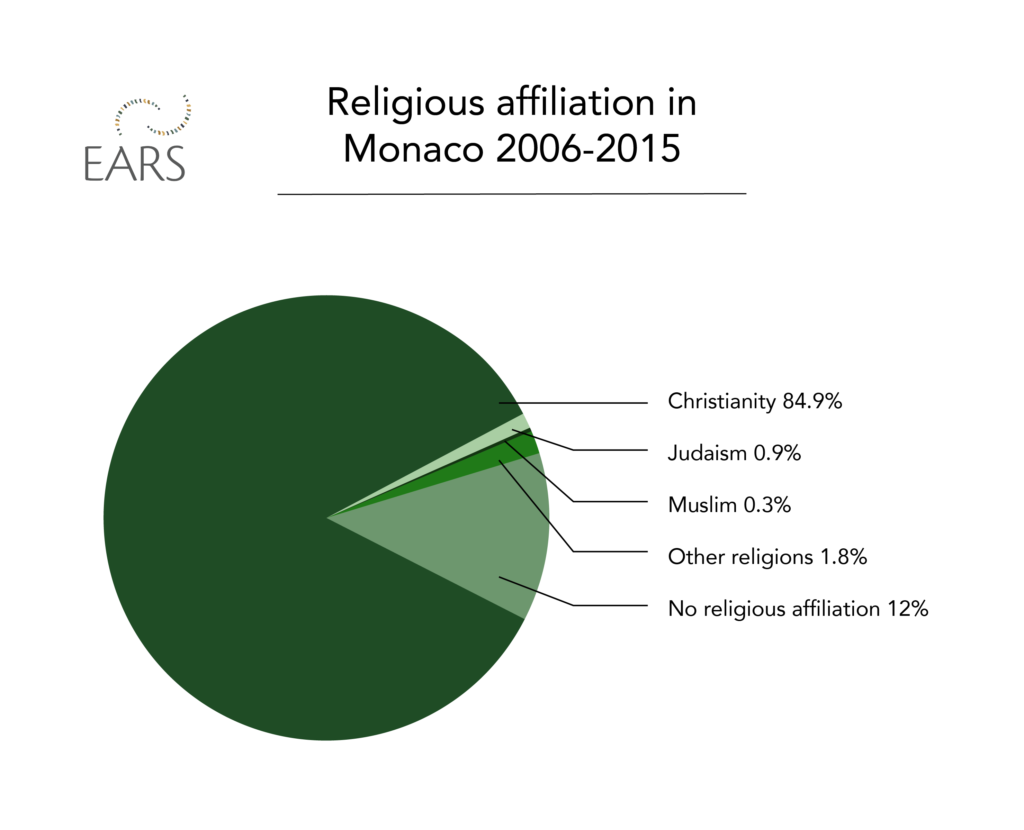
Source: SMRE
Roman Catholicism is the state religion in Monaco, but the constitution also guarantees freedom of religion. More than 80 percent of the population is Catholic.[28] Religious instruction is included in the school curriculum unless exemption is requested.[29]Muslims make up about 0.8% of the population. Even though the law permits private, non-Catholic religious schools, there are neither mosques nor Islamic private schools in Monaco due to insufficient demand. Most private religious schools are Catholic, but they are also required to provide instruction for religions other than Catholicism.[30]
Extra Islamic RE after school hours
The ‘Religion for all’ approach includes no specific religious instruction in state schools. However, the state provides teachings about religions including Islam and facilitates the establishment of separate religious private schools. This model is followed by the United Kingdom, the Netherlands, Monaco and, to some extent, Ireland.
In the UK and the Netherlands, lessons in worldviews and religions are provided in state schools, whereas RE is a solid part of the national curriculum of predominantly Catholic Monaco and Ireland. Muslim pupils in Monaco can attend lessons in religions in Catholic schools, while students in Ireland can attend state-funded Muslim primary schools and several supplementary schools.
Nevertheless, due to the small numbers of state-funded Muslim schools, the majority of Muslim students in the aforementioned countries attend supplementary schools or local mosques to receive Islamic RE after regular school hours. It shows that the demand of Muslim communities for recognition and inclusion in the educational system has not been met.
In the next article in this series, we will discuss the third model: ‘IRE as a subject in state schools’. Stay tuned!
Want to learn more about similar topics? Go to the EARS Dashboard and receive weekly updates.
[1] Jackson, Robert & Miedema, Siebren & Weisse, Wolfram & Willaime, Jean-Paul. (2007). Religion and Education in Europe: Developments, Contexts and Debates.
[2] Religious education across the UK
[3] Roman Catholic, Presbyterian, Anglican and Methodist.
[4] Religious education across the UK; Curriculum
[5] Muslim population in the UK
[6] Muslim Schools in Britain: Challenging mobilisations or logical developments?
[7] Muslim Schools in Britain: Challenging mobilisations or logical developments?
[8] State schools receive funding through their local authority or directly from the government. Types of school Jackson, Robert & Miedema, Siebren & Weisse, Wolfram & Willaime, Jean-Paul. (2007). Religion and Education in Europe: Developments, Contexts and Debates.
[9] Muslim families sending children to Catholic schools
[10] ‘It’s confusing’ Muslim pupils outnumber Christians in dozens of Britain’s church schools
[11] Census of Population 2016 – Profile 8 Irish Travellers, Ethnicity and Religion.
[12] Albrecht Fuess (2007) Islamic Religious Education in Western Europe: Models of Integration and the German Approach, Journal of Muslim Minority Affairs, 27:2, 215-239, DOI: 10.1080/13602000701536166
[13] Albrecht Fuess (2007) Islamic Religious Education in Western Europe: Models of Integration and the German Approach, Journal of Muslim Minority Affairs, 27:2, 215-239, DOI: 10.1080/13602000701536166
[14] NCCA Curriculum Online Read More
[15] The Muslim National School and The North Dublin Muslim School. Muslim Education Board: Our Schools
[16] Albrecht Fuess (2007) Islamic Religious Education in Western Europe: Models of Integration and the German Approach, Journal of Muslim Minority Affairs, 27:2, 215-239, DOI: 10.1080/13602000701536166
[17] • Netherlands – total population 2015-2025
[18] (PDF) Islamic Schools in the Netherlands: Expansion or Marginalization?
[19] Islam in the Netherlands – Statistics & Facts
[20] Half a century of Islamic education in Dutch schools
[21] Kerndoelenboekje basisonderwijs | Rapport
[22] Voorstel basiscurriculum Levensbeschouwing en Religie
[23] Albrecht Fuess (2007) Islamic Religious Education in Western Europe: Models of Integration and the German Approach, Journal of Muslim Minority Affairs, 27:2, 215-239, DOI: 10.1080/13602000701536166
[24] Islamic schools in the Netherlands 2018, by type.
[25] Half a century of Islamic education in Dutch schools
[26] For more details: (PDF) Islamic Schools in the Netherlands: Expansion or Marginalization?
[27] (PDF) Islamic Schools in the Netherlands: Expansion or Marginalization?
[28] Die Religiöse Zusammensetzung Von Monaco | 2021
[29] L’ÉDUCATION EN PRINCIPAUTÉ DE MONACO LIVRET D’ACCUEIL; The Primary and Secondary Education System in Monaco / Primary and secondary education / Education and teaching / Education / Public Services for Individuals
